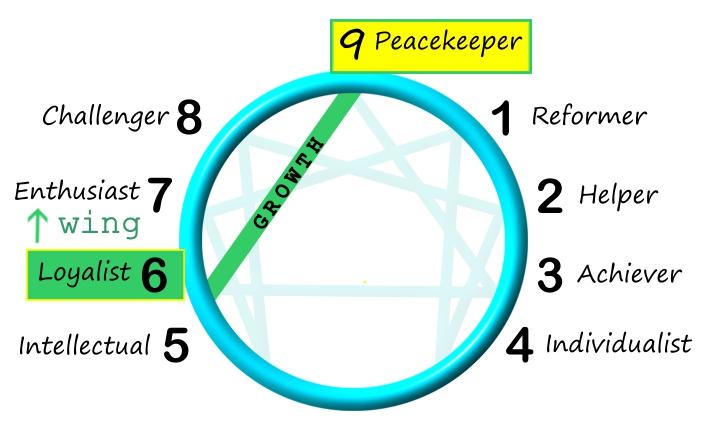
WHAT’S UNDER THE HOOD?
The engine is secondary to a Type Six. What is primary is the logo that brands the grill. For example, a loyalist may love a Ford because his father had a Ford, and his father had one, and his father’s father had one. They are a Ford family, and they trusted Ford for all of their lives. That’s their loyalty.
KEY INGREDIENTS A TYPE SIX LOYALIST
- TENDS TO SHY AWAY FROM THE SPOTLIGHT AND LEADERSHIP ROLES – Individually speaking their minds is not their forte. They are much more comfortable following than leading.
- TRUST ISSUES –The average type six will have a hard time trusting their own opinion and will quite often conclude, “If I can’t trust myself, how can I trust you?” Trusting an individual is often an uphill battle for them, and this is why many seek refuge in groups.
- SUSPICION – even when some sort of trust is established, there will always be a sense that “someone is out to get them” or “a system is working against them.” These are suspicions based upon zero evidence, but purely on feelings. For example, men following the MGTOW (Men Go Their Own Way movement), will be paranoid that a woman is out to get them, out to steal their wealth, and ruin their life, even though they have no proof that the woman they are dating has that agenda.
- COLLECTIVE THINKING – One represents all. One bad man represents all men. One bad cop represents all cops. One sick priest represents all priests. It’s highly inaccurate logic, but collective thinking is always there in the background of a typical loyalist.
- GROUP THINK – Whatever the group thinks, they think.
- UNWAVERING DEVOTION – Once a loyalist finds a rescuer, be it a group or an individual, their conviction will be, for the most part, unshakable. And quite often, even if their rescuer is proven to be the Anti-Christ, they will still go down with the ship.
- THEY CAN FALL IN LOVE VERY QUICK – Because Type Sixes are seeking a rescuer, they tend to fall in love faster than any other personality. And it’s not fake or emotional love; it is true, head-over-the-heels love.
THEIR IMMEDIATE DEFENSE
Type Sixes, by nature, have trust issues because they don’t trust themselves. So when they are triggered, they will immediately travel to a place of skepticism.
WHAT ARE THEIR GREATEST FEARS?
This may sound weird, but the Loyalists have a very unique personality because they fear themselves more than anything else.
This usually stems from unresolved issues of abandonment, which are often caused by parenting issues. Consequently, many are not capable of creating their own opinions, holding their own viewpoints, or even possessing their own morals. Quite often, the solution for a type six is to become part of a group that will tell them what to think and believe.
Primarily, they are looking for rescuers to save them from an unending feeling of abandonment.
REAL-WORLD EXAMPLES
The Type Six Loyalist is the most common personality in the world. Civilizations are divided by agendas, ideals, and politics – which naturally give birth to groups, where many loyalists can find security.
IN POLITICS…
Democrats, Republicans, Green Party to Socialist, and we have the Libertarians, and that’s only in America. Ideologies where many loyalists can create an identity and find meaning.
IN GANGS ORGANIZED CRIME…
Usually, where you will find a plethora of single mothers, you will also find a plethora of gangs. This is because most gangs provide the mirage of love and support of a family.
IN THE CHURCH
Many go to the church family to fill that hole in their lives. This is obviously a much better choice than joining a gang. Ironically, you will find many former and active gang members in the church pews.
IN ACTIVISTS MOVEMENTS
These movements were very short-lived, but they provided a sense of belonging for loyalists who constantly needed to feel purposeful.
WHAT IS THEIR SPIRIT ANIMAL?
Well, I guess I didn’t get to the good parts of the Type Six personality. Let’s just say that Loyalists are great because they are, well – loyal. You will never find a better friend, spouse, or business partner, other than a loyalist. They will be at your side through the good and bad, thick and thin, even through the ugly.
What animal represents this form of companionship?
Look no further than a German Shepard, one of the most loyal dog breeds out there.
FICTIONAL CHARACTERS
“DICK GRAYSON” BATMAN’S FIRST ROBIN
As of 2019, there has been a total of five “Robin’s” for Batman. The first Robin, Dick Grayson, was your typical loyalist, a character who lost his parents at a young age and seeked a rescuer in Batman. In this case, Grayson didn’t find salvation in a group, but an individual. That’s when they are healthy by the way. When they get away from the group.
Dick Grayson, like many loyalists, took on the characteristics of his savior.
“CHEWBACCA” HAN SOLO’S SIDEKICK
Yes, our favorite 7’5 hairball is a Type Six Loyalist who followed Han though thick and thin, even if it meant breaking the law, and going against his own objections.
THEIR FUNCTION IN LIFE
Loyalists are the good wives, the great husbands, the trusty sidekicks, the dependable business partners who will hang in there when the going gets tough. They will always be by your side, never really craving the limelight, they’ll just feed off your leadership.
For many of us, a loyalist is a central ingredient to making life a lot more enjoyable – not to mention, a lot more easy. Who couldn’t use a great partner?

TRIGGERS OF THE TYPE SIX
The characteristics of a Type Three will often trigger a type six. A charismatic individual, with the fancy car, the nice clothes, the grand stories of success, can trigger a Type Six’s trust issues. The walls of a Type Six would instantly come up, and in many cases, rightfully so – Type 3’s, especially the unhealthy ones, you should be wary of. But unhealthy Type Sixes will often judge a book by its cover, not by their value. If they are with a different tribe, a different think-tank, the wrong religion, the wrong political affilation, this personality type has the potential to automatically demonize them
The irony is that even though a type six would be triggered by a type three, when the loyalists deteriorate, they can look like a Type Three. They can be very image-oriented, especially if they are part of a group.
Unhealthy Loyalists who are gang members can be overly concerned about the colors or tattoos that they wear. Even church members could be overly concerned with the way they act, who they hang around with, and so forth.
THE UNHEALTHY TYPE SIX
Counterphobia.
Remember that word.
Counterphobia.
Counter has many meanings, but in this case, it means to hit back or to retaliate.
Phobia – is an unreasonable fear.
Put these two words together, and Counterphobia literally means to retaliate against something or someone that one has an unreasonable fear of. And in many cases, that retaliation can result in destruction and in some cases, death.
An unhealthy six, at their worse, is often – counterphobic. And quite often, they, the unhealthy loyalist will destroy their fear instead of reasoning, or dealing with it. We know it as “Cancel Culture.”
It’s a form of self-sabatoge and at the same time, a strange way of protecting themselves from getting hurt. In other words, “It, or they, can’t hurt me if it or they don’t exist.”
Here’s a fictional example of a counterphobic individual we’ll call Jim. Jim is scared of escalators, he can’t stand the noise they make, he can’t walk on them, he can’t stand the color.
Jim sees the head doctor and tells him, “Oh, I’ve dealt with my fears, sir.”
“Oh,” the doctor asks.
Jim grins, “I destroyed the building. No escalator – no fear.”
This is counterphobia, and the results of it can be as simple as destroying lifelong friendships in the blink of an eye to downright – murder. Yes, most of the violent crimes out there are often the result of an Unhealthy, Counterphobic Loyalist. Counterphobia is the motivation behind most terrorists. It was behind the Nazi’s motivation to exterminate the Jews. And it’s behind most murder-suicide cases where a loved one kills their soulmate because they fear the worse. It is, most often, the root cause of many school shootings.
Again, this is cancel culture.
TESTING RELATIONSHIPS
Because of their trust issues, loyalists often test the strength of their relationships. Many of these tests are designed unfairly to cause their partner to fail.

GROWTH FOR A TYPE SIX LOYALIST
As with all personalities, growth will come from taking actions that will cut against the grain of their super-ego.
ABANDONING GROUPTHINK, GROUP THEOLOGY
When loyalists apply their devotion to an individual rather than a group, real growth starts. For example, when a loyalist decides to love Jesus rather than the church, there’s growth. Or when a father decides to love his wife more than his gang of friends, that’s growth.
EMBRACING THEIR SEVEN WING
Type Sevens enjoy life, not to mention the world, to its fullest extent. They think out of the box, are very open-minded, and don’t put limitations on themselves. When a Type Six embraces this wing, they avoid the downfalls of groupthink and are much more open to ideas and thinking freely.
THE IDEAL HEALTHY SIX
A healthy Type Six has abandoned most or all of its groupthink theology and has become more trusting of individuals. They will stop testing relationships and creating scenarios for their partners or friendships to fail. Healthy loyalists will also stop becoming overly suspicious and paranoid of others.
SPOTTING A SIX
A Type Six is your typical follower and quite often, don’t lead. It’s not that they can’t think independently, or are incapable of doing so, it’s because they fear thinking for themselves. They don’t believe in themselves. That’s why they need someone, a group, or an individual, that will rescue them, and tell them what to do. Some can say that their primary focus in life is to find a rescuer.
Most loyalists come from broken families, specifically ones without father figures. It’s not the golden rule, but the odds are very high.
HOW THEY WORK
A Type Six works well in groups. In fact, I would say they thrive in group settings as they are loyal to a company, cause, or leader. They can be the best sidekick.
MISCHARACTERIZATION
A Type Six Personality can often look like any person or group they cherish. For example, if their rescuer is a Type One radicalized protestor, then the Type Six would look like that Type One, and repeat every talking point of that Type One. But their not a Type One, they are in fact, just followers.
This is very common with cult leaders, who are often Type Ones, and their followers are Type Sixes. The difference between the two, one is the leader, the other is a follower. The Type One can think independently, while the Type Six will fear independent thought.
Next personality up, The Type Seven “Enthusiast.”



